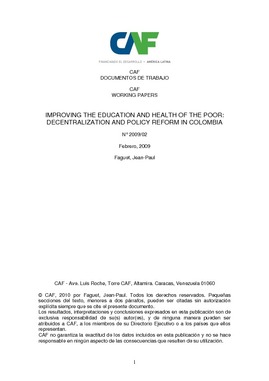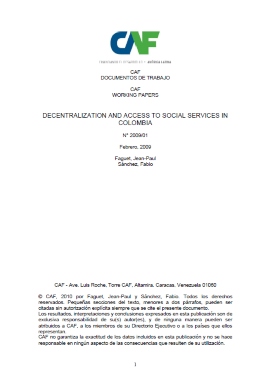Improving the education and health of the poor: decentralization and policy reform in Colombia
Resumo
A central claim in favor of decentralization is that it will improve access to public services, but few studies examine this question empirically. This paper, the policyoriented companion to Faguet and Sánchez (2009), explores the effects of decentralization on the uses and spatial distribution of public investment, and on access to health and education services in Colombia. I show that investment shifted from infrastructure to social services and human capital formation, and resources were rebalanced in favor of poorer districts. Decentralization improved enrollment rates in public schools and access to public health services. In both cases, poor people benefitted most. Four important lessons emerge. For decentralization to work well, (i) local governments must face harder budget constraints; (ii) central government must be scaled back; (iii) decentralization is composed of distinct, separable components, the sequencing of which is important.
Assunto
País / Región
Data
2009Cite esta publicação
Item que pertence à coleção
Autor
Faguet, Jean-PaulItems Relacionados
Decentralization and Access to Social Services in Colombia
A central claim in favor of decentralization is that it will improve access to public services, but few studies examine this question empirically. This ...
Latin America in the global economy. Advancing market access
Given its commitment to the design and execution of a renewed development agenda for Latin America, CAF supports the region in its objective of achieving ...
Anniversary RED. Knowledge that Transforms. Twenty years serving a prosperous, inclusive, and sustainable future
This commemorative edition of CAF’s RED series reflects on the progress and challenges of development in Latin America and the Caribbean over recent ...





